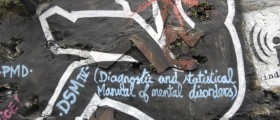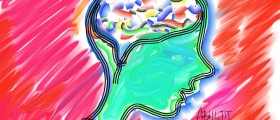
Overview of Psychosis
Psychosis is a mental disorder or a syndrome most often characterized by difficulty to separate reality from fantasy. The most recognizable features of psychosis are hallucinations and delusions. Many individuals who are psychotic also manifest changes in personality. Psychosis is a fairly severe psychological disorder followed by impaired daily functioning, social interactions, and strange behavior. Individuals are not born with psychosis but rather develop the symptoms as a result of illnesses. Many medical conditions which result in chemical imbalance in the brain can to some extent produce episodes of psychotic behavior.
Signs and Symptoms
Delusional beliefs and behaviors are very common in psychotic individuals. Some delusions may not be related to the individual’s life, whereas others stem from cultural or religious background. Delusional thinking is manifested through beliefs that other individuals or groups are in control of one’s thoughts or actions. Hallucinations, on the other hand, are perceptions in the absence of stimuli. Experiencing perceptions in the absence of stimuli can happen in any of the five senses. Many individuals who are suffering from hallucinations believe to have interacted with people or lived through certain experiences. They are perceiving impressions of something that is either not present or it does not exist at all. Incorrect perceptions can also be signs of brain tumors or poisoning. Psychotic individuals often hear voices that speak to or about them and many are feeling anguish as a result. On the other hand, there has been a substantial amount of research articles showing that hearing voices is not always an unfavorable experience. Psychotic individuals usually have problems with speaking and writing coherently. Those suffering from psychosis are characterized by literal thinking, and inability to carry a conversation. The emotional state of such individuals is also disturbed as it is not always compatible with what they are thinking or it oscillates from deep depression to hypermania. Psychotic persons’ faulty beliefs cannot be refuted by the presentation of a logical explanation.
Causes of Psychosis
Causes of psychosis are other underlying conditions which either physically affect the brain or result in functionality problems even though there is no physical illness. Disorders such as schizophrenia or substance abuse are known to induce psychosis. Individuals suffering from schizophrenia will often hear voices judging their behavior and thoughts. Experiencing paranoid incidences is also very common in patients affected by this disorder. Combining drugs and alcohol or abusing prescription medications is a known pathway to psychotic symptoms. In addition, there is a wide range of other disorders such as bipolar disorder or depression which can also lead to delusional or hallucinating episodes. There are also various personality disorders, such as paranoid or borderline personality disorders that have been linked to psychosis. In addition, acute or chronic psychological distress which does not necessarily requires a clinical diagnosis can also be responsible for causing psychotic episodes. Psychosis can be sporadic, induced by stressful events or it can continuously last for years. In addition, there are various states in which individuals who are not under stress or suffering from an underlying psychosis causing illness can also experience hallucinations or delusions. For instance, substantial sleep as well as sensory deprivation can lead to hallucinations. Seeing, or hearing the voice of a deceased close family member or a friend is also a fairly common occurrence in individuals who do not require a clinical diagnosis. Finally, there are numerous other illnesses which pertain to psychosis. For instance, genetic disorders of the nervous system and acute confusional states might lead to delusions or hallucinations. Types of sclerosis, cancers, Alzheimer’s, and Parkinson’s diseases can all trigger acute or chronic psychotic states. Any kind of disorder which interferes with normal functioning of attention, memory, and orientation can subsequently lead to delusions or hallucinations. Sleep disorders, malnutrition or starvation, and poisoning are contributory factors to the development of psychotic symptoms. Autoimmune disorders, genetic or obtained anomalies of the metabolic system, liver or renal failure as well as disorders of the hormonal glands can also cause psychotic episodes to happen. Finally, withdrawal from drugs or alcohol induces psychotic symptoms.
Diagnosis and Treatment of Psychoses
When it comes to diagnosing psychosis, a primary health care professional will be concerned with the medical history of the patient as well as the presence of any underlying conditions which may be manifesting themselves through delusions or hallucinations. The clinician will also ask for a blood test. As far as the treatment goes, the medical provider who is likely to be in charge of therapy is a psychiatrist. A psychiatrist will recommend a course of treatment best suited for a particular individual. Prescribed medications are usually the first line of treatment and in case of psychosis include major tranquilizers. Their function is not to sedate a person, but instead decrease the frequency and intensity of psychotic symptoms. Various types of psychotherapy can also help.

















Your thoughts on this
Loading...